In-Depth Nutrition Assessment: Analyzing Diet and Nutrient Intake
VerifiedAdded on 2023/06/15
|32
|3950
|457
Report
AI Summary
This assignment presents a comprehensive nutrition assessment based on a 7-day diet plan. The analysis includes evaluating energy, carbohydrate, fat, and protein intake, as well as assessing vitamin and mineral consumption. The report reveals that the diet is high in carbohydrates, sugars, fats, and cholesterol, with inadequate intake of fresh fruits, vegetables, and dairy. The assessment compares actual nutrient intake with recommended daily allowances (RDAs) and suggests dietary modifications to improve overall health. Specific areas of focus include increasing fiber intake, reducing saturated fat consumption, and balancing protein sources. The analysis also identifies specific foods contributing to high sugar and fat intake and recommends alternative, nutrient-rich options. This detailed evaluation provides a foundation for developing a personalized nutrition care plan to address identified deficiencies and promote better health.
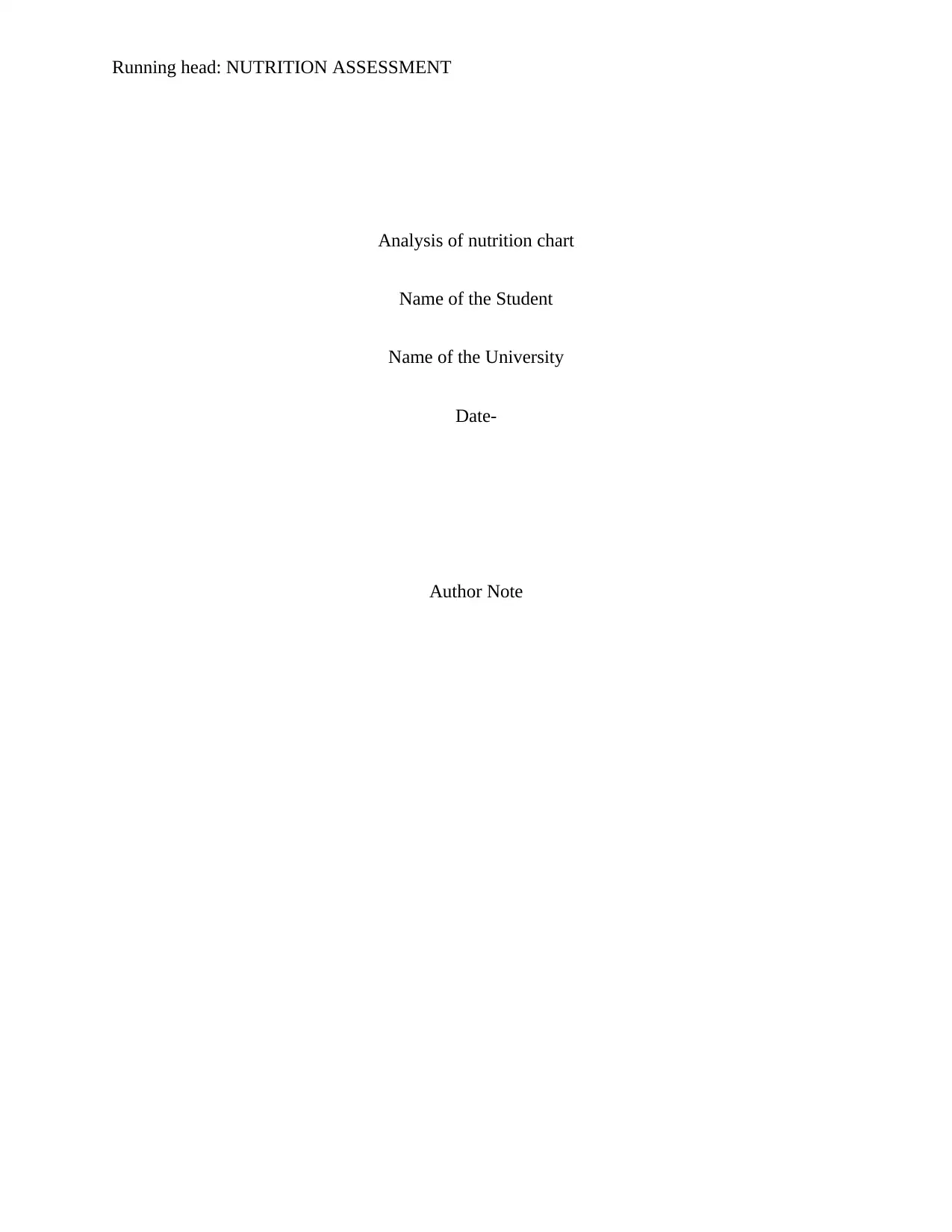
Running head: NUTRITION ASSESSMENT
Analysis of nutrition chart
Name of the Student
Name of the University
Date-
Author Note
Analysis of nutrition chart
Name of the Student
Name of the University
Date-
Author Note
Paraphrase This Document
Need a fresh take? Get an instant paraphrase of this document with our AI Paraphraser
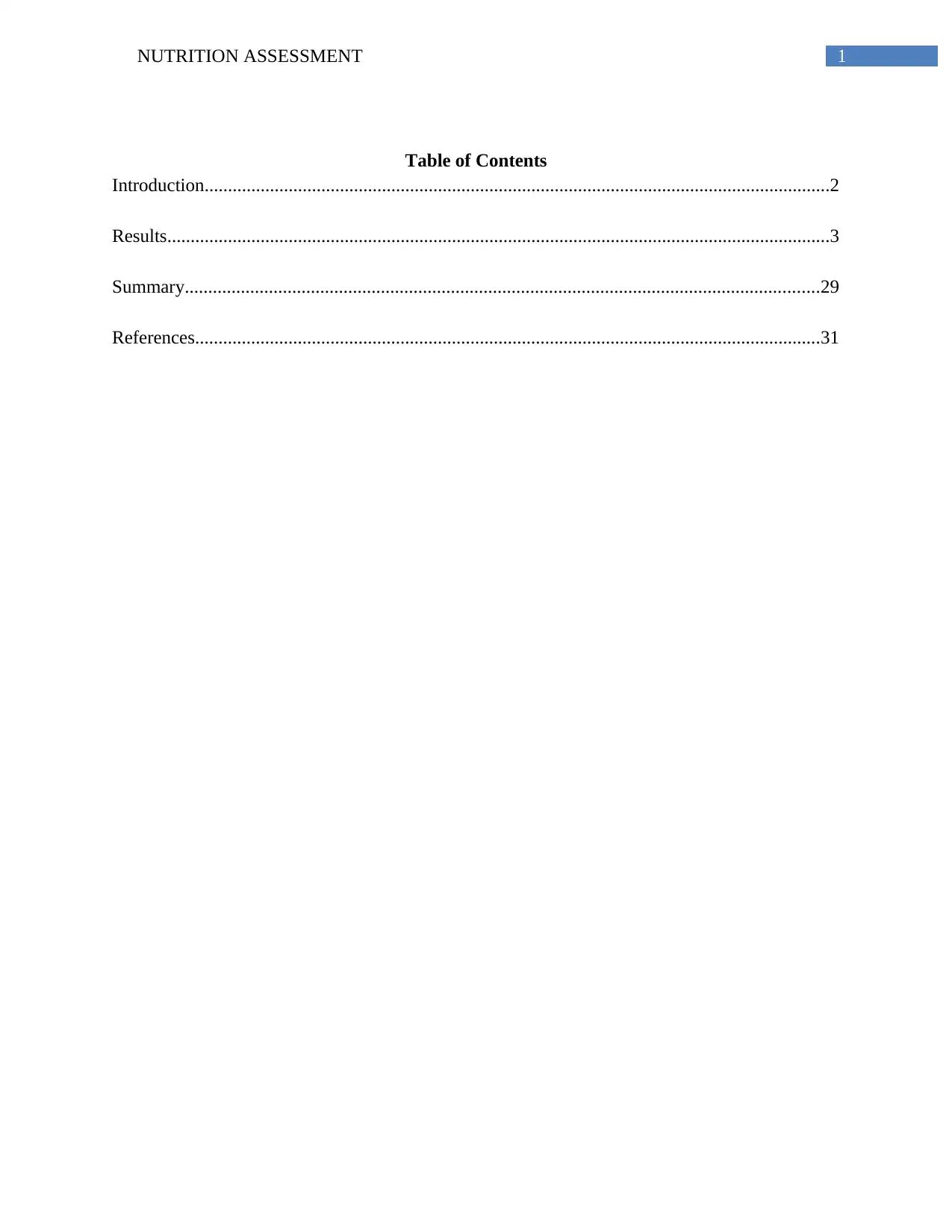
1NUTRITION ASSESSMENT
Table of Contents
Introduction......................................................................................................................................2
Results..............................................................................................................................................3
Summary........................................................................................................................................29
References......................................................................................................................................31
Table of Contents
Introduction......................................................................................................................................2
Results..............................................................................................................................................3
Summary........................................................................................................................................29
References......................................................................................................................................31
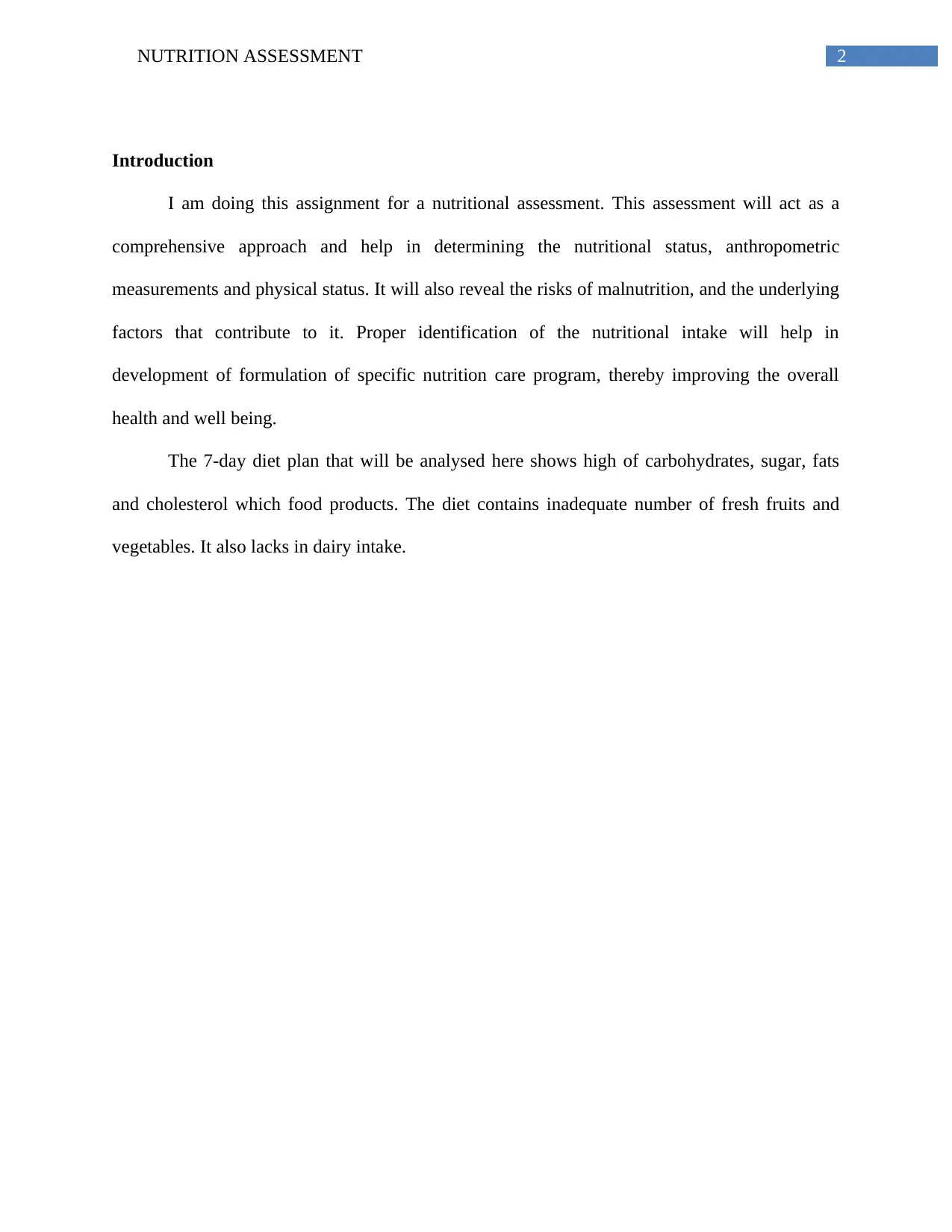
2NUTRITION ASSESSMENT
Introduction
I am doing this assignment for a nutritional assessment. This assessment will act as a
comprehensive approach and help in determining the nutritional status, anthropometric
measurements and physical status. It will also reveal the risks of malnutrition, and the underlying
factors that contribute to it. Proper identification of the nutritional intake will help in
development of formulation of specific nutrition care program, thereby improving the overall
health and well being.
The 7-day diet plan that will be analysed here shows high of carbohydrates, sugar, fats
and cholesterol which food products. The diet contains inadequate number of fresh fruits and
vegetables. It also lacks in dairy intake.
Introduction
I am doing this assignment for a nutritional assessment. This assessment will act as a
comprehensive approach and help in determining the nutritional status, anthropometric
measurements and physical status. It will also reveal the risks of malnutrition, and the underlying
factors that contribute to it. Proper identification of the nutritional intake will help in
development of formulation of specific nutrition care program, thereby improving the overall
health and well being.
The 7-day diet plan that will be analysed here shows high of carbohydrates, sugar, fats
and cholesterol which food products. The diet contains inadequate number of fresh fruits and
vegetables. It also lacks in dairy intake.
⊘ This is a preview!⊘
Do you want full access?
Subscribe today to unlock all pages.

Trusted by 1+ million students worldwide
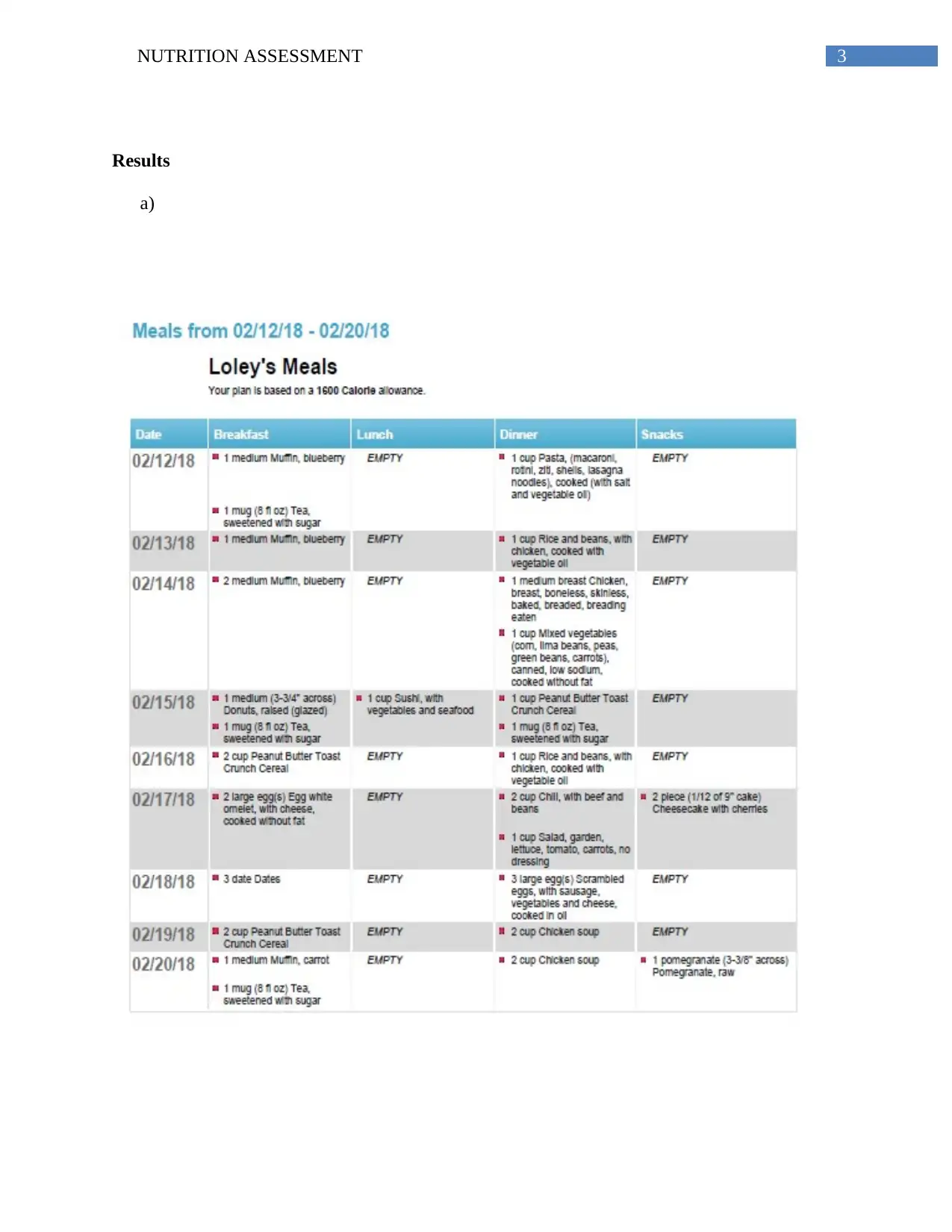
3NUTRITION ASSESSMENT
Results
a)
Results
a)
Paraphrase This Document
Need a fresh take? Get an instant paraphrase of this document with our AI Paraphraser
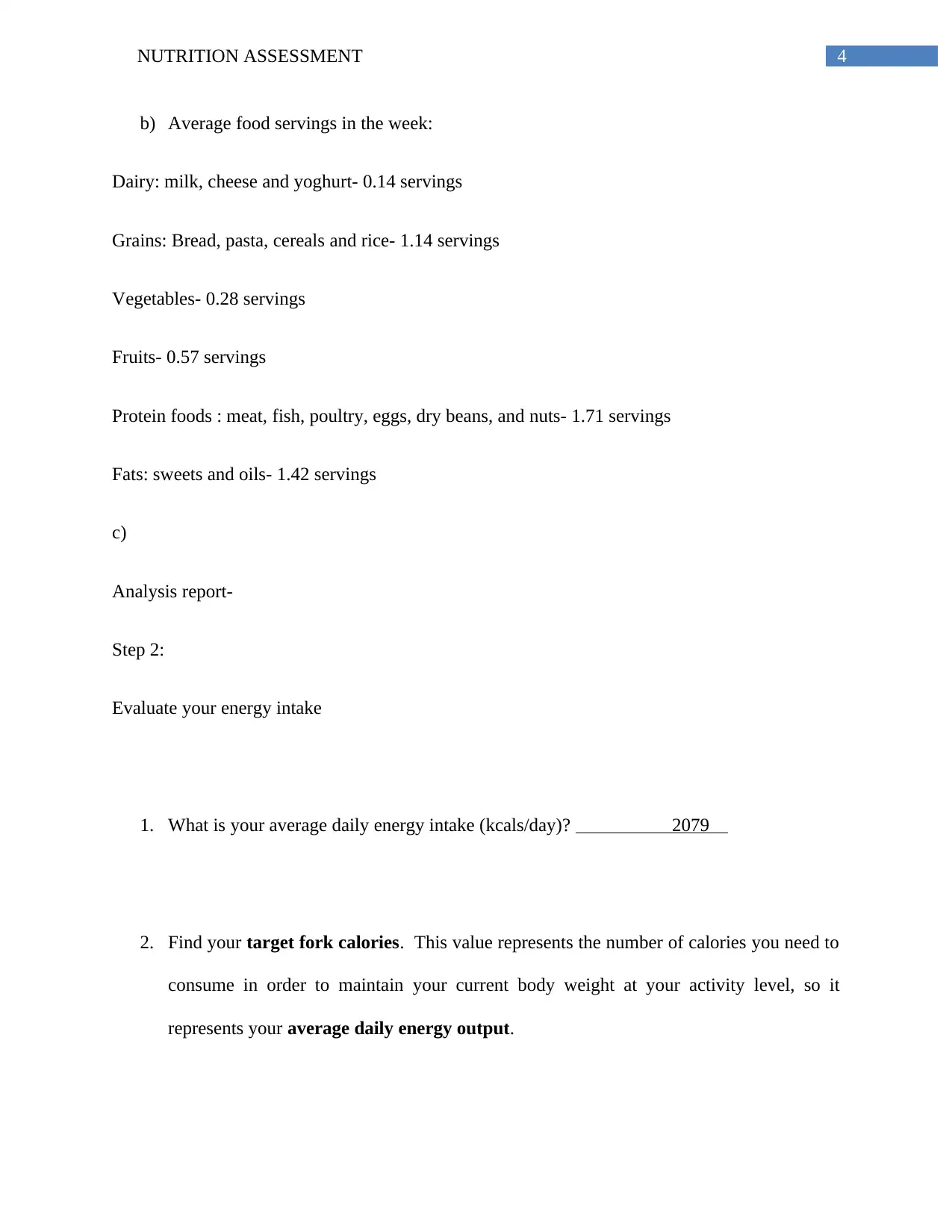
4NUTRITION ASSESSMENT
b) Average food servings in the week:
Dairy: milk, cheese and yoghurt- 0.14 servings
Grains: Bread, pasta, cereals and rice- 1.14 servings
Vegetables- 0.28 servings
Fruits- 0.57 servings
Protein foods : meat, fish, poultry, eggs, dry beans, and nuts- 1.71 servings
Fats: sweets and oils- 1.42 servings
c)
Analysis report-
Step 2:
Evaluate your energy intake
1. What is your average daily energy intake (kcals/day)? 2079
2. Find your target fork calories. This value represents the number of calories you need to
consume in order to maintain your current body weight at your activity level, so it
represents your average daily energy output.
b) Average food servings in the week:
Dairy: milk, cheese and yoghurt- 0.14 servings
Grains: Bread, pasta, cereals and rice- 1.14 servings
Vegetables- 0.28 servings
Fruits- 0.57 servings
Protein foods : meat, fish, poultry, eggs, dry beans, and nuts- 1.71 servings
Fats: sweets and oils- 1.42 servings
c)
Analysis report-
Step 2:
Evaluate your energy intake
1. What is your average daily energy intake (kcals/day)? 2079
2. Find your target fork calories. This value represents the number of calories you need to
consume in order to maintain your current body weight at your activity level, so it
represents your average daily energy output.
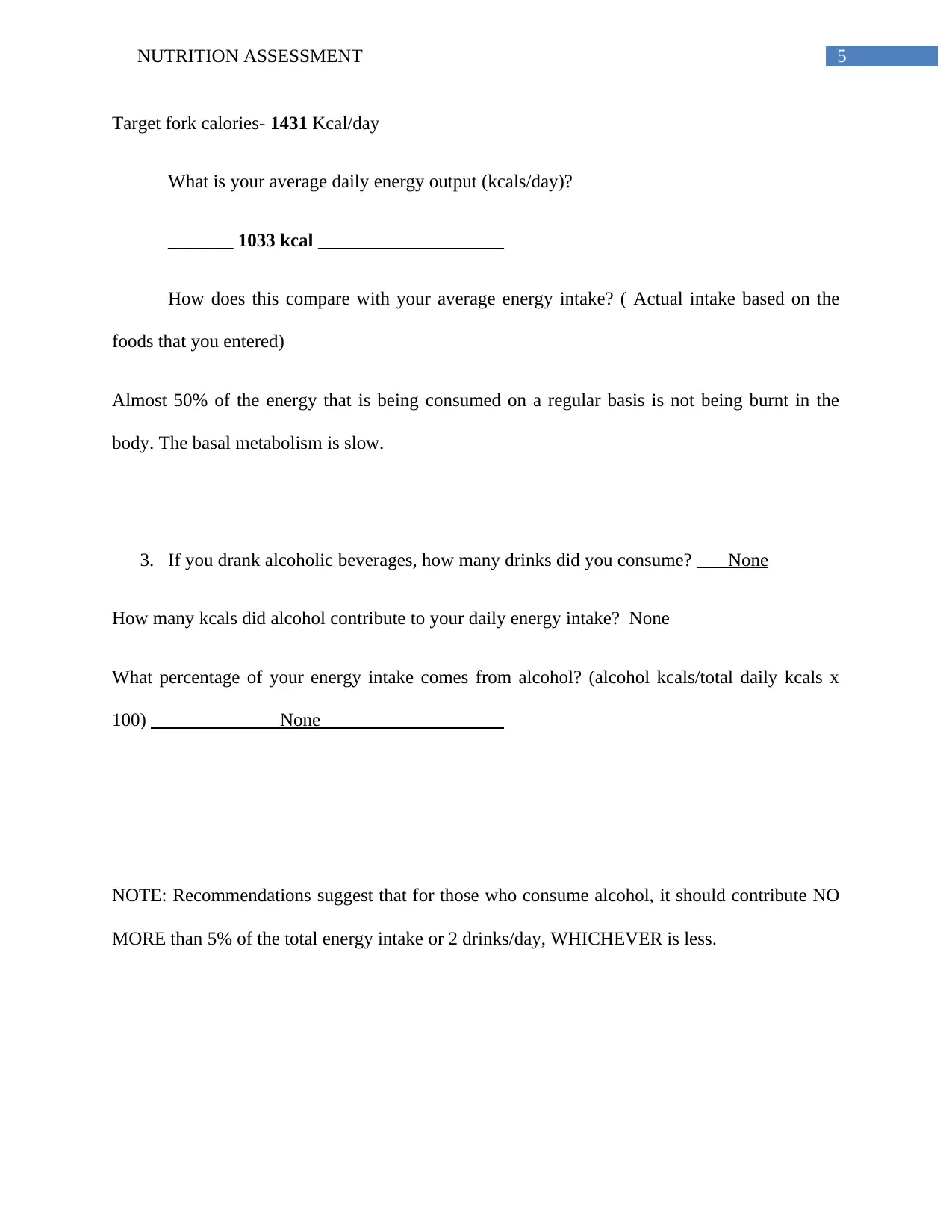
5NUTRITION ASSESSMENT
Target fork calories- 1431 Kcal/day
What is your average daily energy output (kcals/day)?
_______ 1033 kcal __
How does this compare with your average energy intake? ( Actual intake based on the
foods that you entered)
Almost 50% of the energy that is being consumed on a regular basis is not being burnt in the
body. The basal metabolism is slow.
3. If you drank alcoholic beverages, how many drinks did you consume? None
How many kcals did alcohol contribute to your daily energy intake? None
What percentage of your energy intake comes from alcohol? (alcohol kcals/total daily kcals x
100) None
NOTE: Recommendations suggest that for those who consume alcohol, it should contribute NO
MORE than 5% of the total energy intake or 2 drinks/day, WHICHEVER is less.
Target fork calories- 1431 Kcal/day
What is your average daily energy output (kcals/day)?
_______ 1033 kcal __
How does this compare with your average energy intake? ( Actual intake based on the
foods that you entered)
Almost 50% of the energy that is being consumed on a regular basis is not being burnt in the
body. The basal metabolism is slow.
3. If you drank alcoholic beverages, how many drinks did you consume? None
How many kcals did alcohol contribute to your daily energy intake? None
What percentage of your energy intake comes from alcohol? (alcohol kcals/total daily kcals x
100) None
NOTE: Recommendations suggest that for those who consume alcohol, it should contribute NO
MORE than 5% of the total energy intake or 2 drinks/day, WHICHEVER is less.
⊘ This is a preview!⊘
Do you want full access?
Subscribe today to unlock all pages.

Trusted by 1+ million students worldwide

6NUTRITION ASSESSMENT
Paraphrase This Document
Need a fresh take? Get an instant paraphrase of this document with our AI Paraphraser
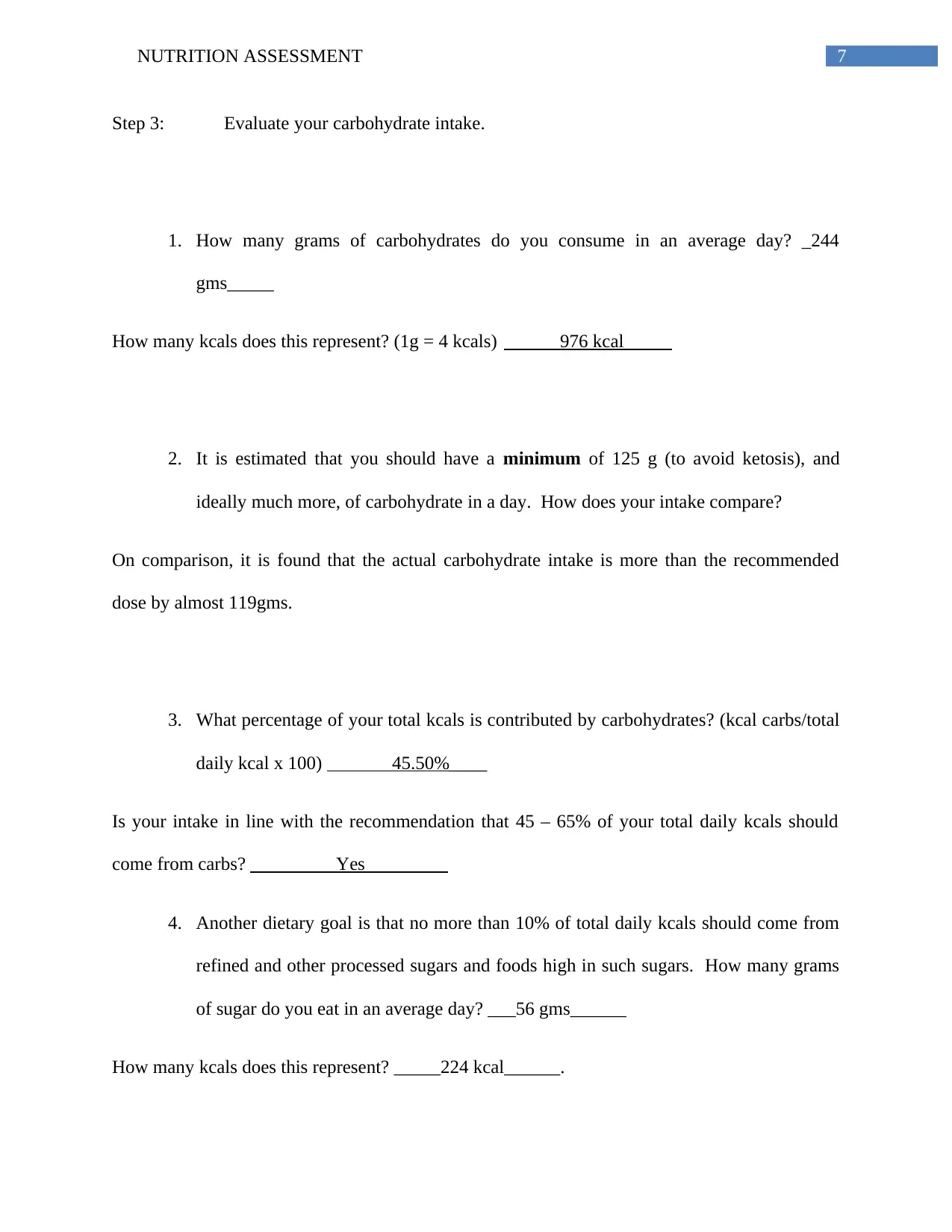
7NUTRITION ASSESSMENT
Step 3: Evaluate your carbohydrate intake.
1. How many grams of carbohydrates do you consume in an average day? _244
gms_____
How many kcals does this represent? (1g = 4 kcals) 976 kcal
2. It is estimated that you should have a minimum of 125 g (to avoid ketosis), and
ideally much more, of carbohydrate in a day. How does your intake compare?
On comparison, it is found that the actual carbohydrate intake is more than the recommended
dose by almost 119gms.
3. What percentage of your total kcals is contributed by carbohydrates? (kcal carbs/total
daily kcal x 100) 45.50%____
Is your intake in line with the recommendation that 45 – 65% of your total daily kcals should
come from carbs? Yes
4. Another dietary goal is that no more than 10% of total daily kcals should come from
refined and other processed sugars and foods high in such sugars. How many grams
of sugar do you eat in an average day? ___56 gms______
How many kcals does this represent? _____224 kcal______.
Step 3: Evaluate your carbohydrate intake.
1. How many grams of carbohydrates do you consume in an average day? _244
gms_____
How many kcals does this represent? (1g = 4 kcals) 976 kcal
2. It is estimated that you should have a minimum of 125 g (to avoid ketosis), and
ideally much more, of carbohydrate in a day. How does your intake compare?
On comparison, it is found that the actual carbohydrate intake is more than the recommended
dose by almost 119gms.
3. What percentage of your total kcals is contributed by carbohydrates? (kcal carbs/total
daily kcal x 100) 45.50%____
Is your intake in line with the recommendation that 45 – 65% of your total daily kcals should
come from carbs? Yes
4. Another dietary goal is that no more than 10% of total daily kcals should come from
refined and other processed sugars and foods high in such sugars. How many grams
of sugar do you eat in an average day? ___56 gms______
How many kcals does this represent? _____224 kcal______.
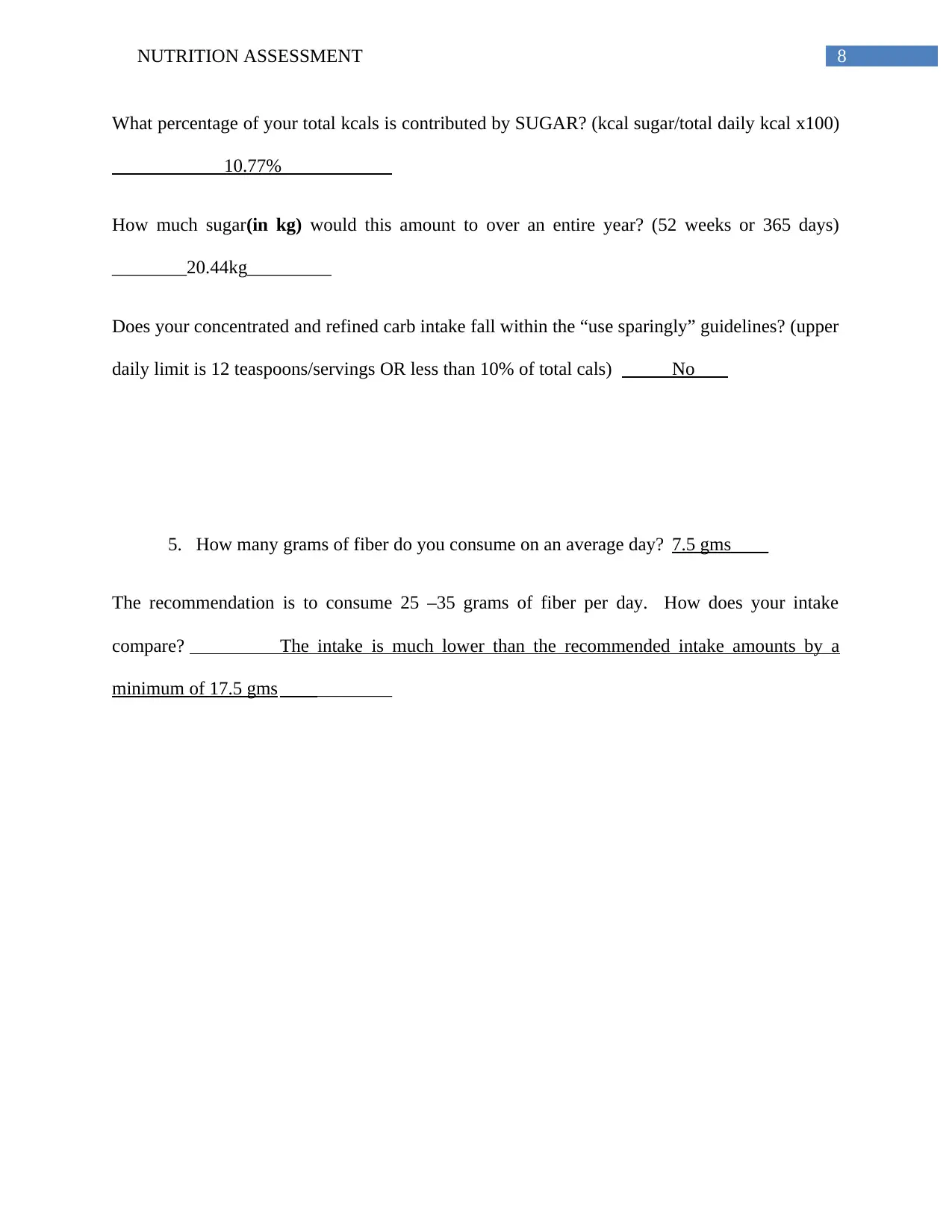
8NUTRITION ASSESSMENT
What percentage of your total kcals is contributed by SUGAR? (kcal sugar/total daily kcal x100)
10.77%
How much sugar(in kg) would this amount to over an entire year? (52 weeks or 365 days)
________20.44kg_________
Does your concentrated and refined carb intake fall within the “use sparingly” guidelines? (upper
daily limit is 12 teaspoons/servings OR less than 10% of total cals) No
5. How many grams of fiber do you consume on an average day? 7.5 gms____
The recommendation is to consume 25 –35 grams of fiber per day. How does your intake
compare? The intake is much lower than the recommended intake amounts by a
minimum of 17.5 gms ____________
What percentage of your total kcals is contributed by SUGAR? (kcal sugar/total daily kcal x100)
10.77%
How much sugar(in kg) would this amount to over an entire year? (52 weeks or 365 days)
________20.44kg_________
Does your concentrated and refined carb intake fall within the “use sparingly” guidelines? (upper
daily limit is 12 teaspoons/servings OR less than 10% of total cals) No
5. How many grams of fiber do you consume on an average day? 7.5 gms____
The recommendation is to consume 25 –35 grams of fiber per day. How does your intake
compare? The intake is much lower than the recommended intake amounts by a
minimum of 17.5 gms ____________
⊘ This is a preview!⊘
Do you want full access?
Subscribe today to unlock all pages.

Trusted by 1+ million students worldwide
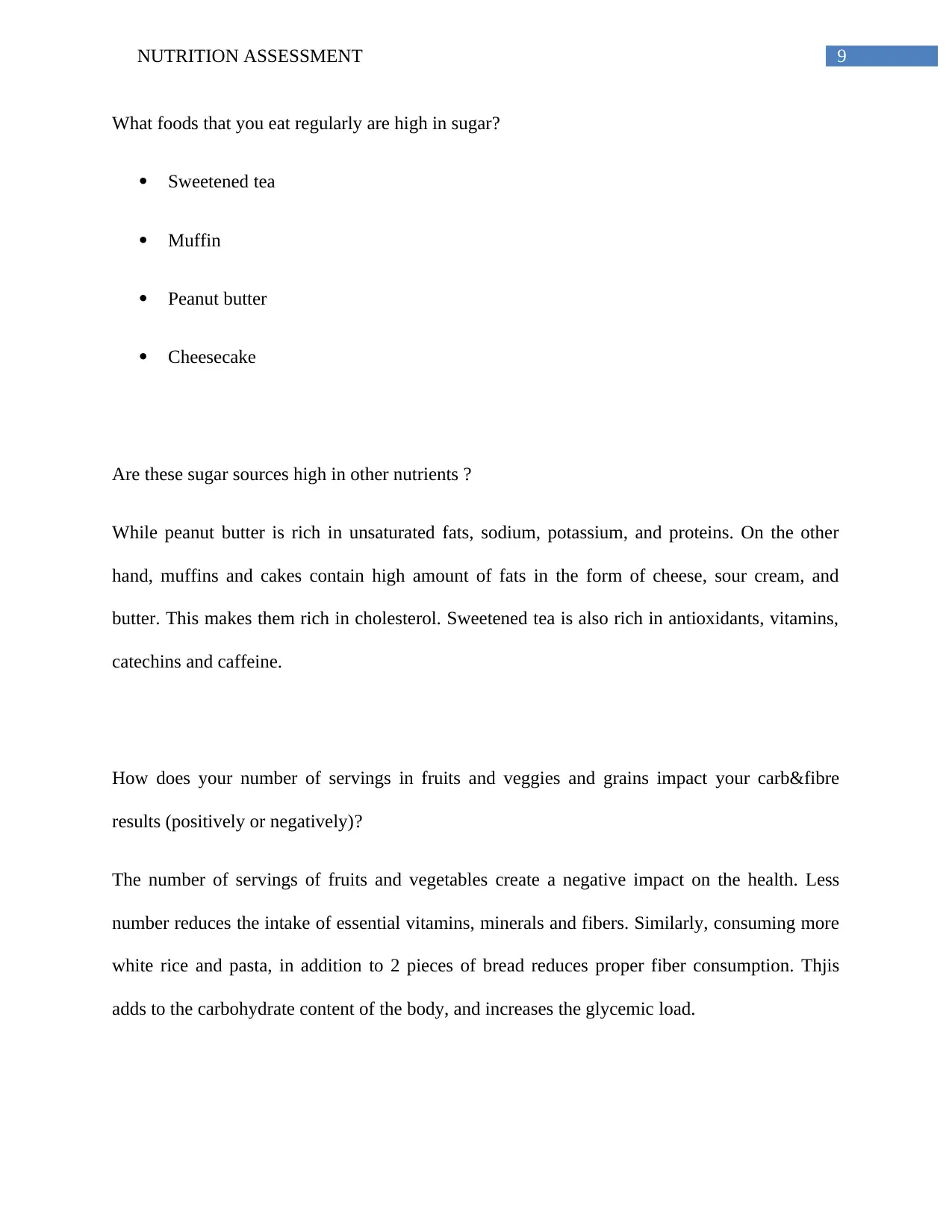
9NUTRITION ASSESSMENT
What foods that you eat regularly are high in sugar?
Sweetened tea
Muffin
Peanut butter
Cheesecake
Are these sugar sources high in other nutrients ?
While peanut butter is rich in unsaturated fats, sodium, potassium, and proteins. On the other
hand, muffins and cakes contain high amount of fats in the form of cheese, sour cream, and
butter. This makes them rich in cholesterol. Sweetened tea is also rich in antioxidants, vitamins,
catechins and caffeine.
How does your number of servings in fruits and veggies and grains impact your carb&fibre
results (positively or negatively)?
The number of servings of fruits and vegetables create a negative impact on the health. Less
number reduces the intake of essential vitamins, minerals and fibers. Similarly, consuming more
white rice and pasta, in addition to 2 pieces of bread reduces proper fiber consumption. Thjis
adds to the carbohydrate content of the body, and increases the glycemic load.
What foods that you eat regularly are high in sugar?
Sweetened tea
Muffin
Peanut butter
Cheesecake
Are these sugar sources high in other nutrients ?
While peanut butter is rich in unsaturated fats, sodium, potassium, and proteins. On the other
hand, muffins and cakes contain high amount of fats in the form of cheese, sour cream, and
butter. This makes them rich in cholesterol. Sweetened tea is also rich in antioxidants, vitamins,
catechins and caffeine.
How does your number of servings in fruits and veggies and grains impact your carb&fibre
results (positively or negatively)?
The number of servings of fruits and vegetables create a negative impact on the health. Less
number reduces the intake of essential vitamins, minerals and fibers. Similarly, consuming more
white rice and pasta, in addition to 2 pieces of bread reduces proper fiber consumption. Thjis
adds to the carbohydrate content of the body, and increases the glycemic load.
Paraphrase This Document
Need a fresh take? Get an instant paraphrase of this document with our AI Paraphraser
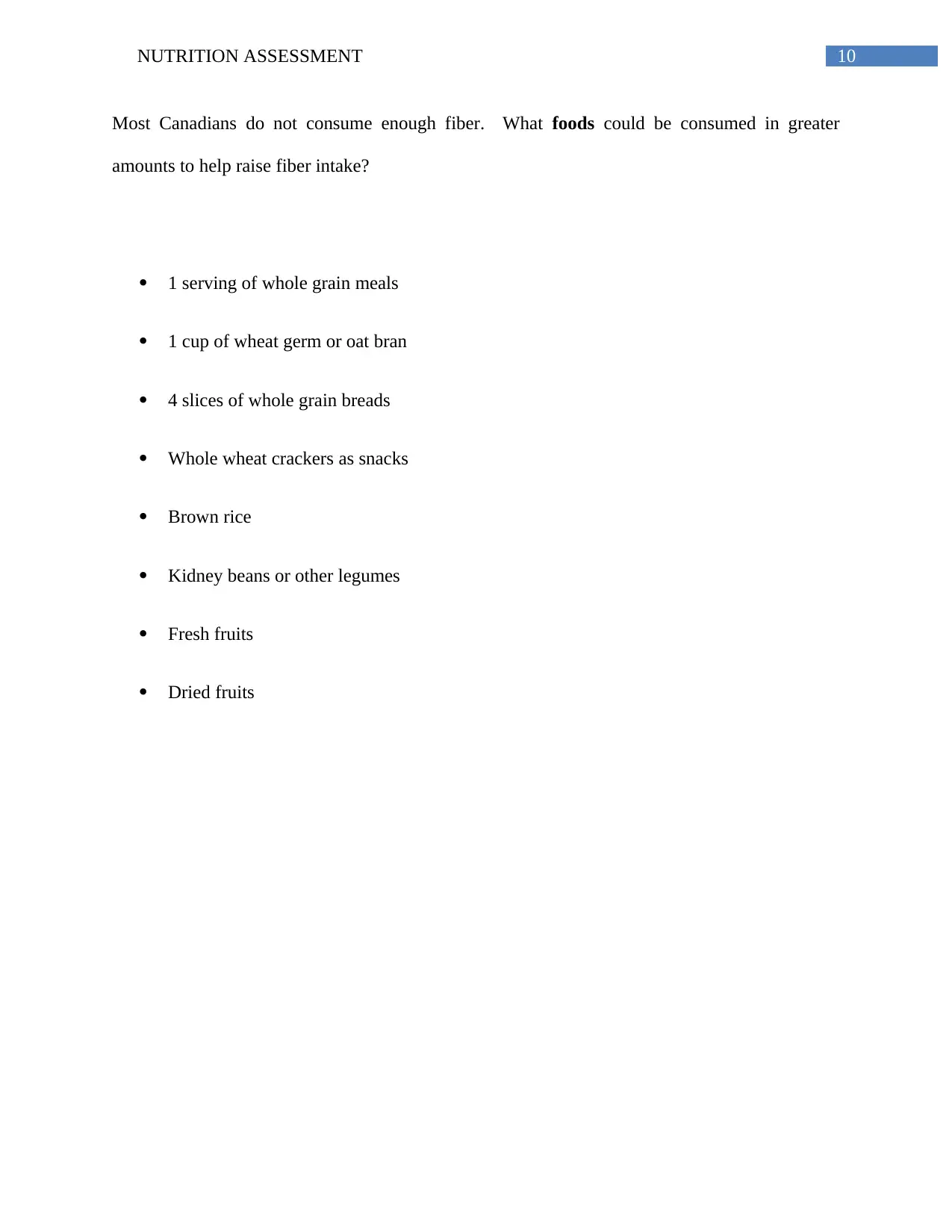
10NUTRITION ASSESSMENT
Most Canadians do not consume enough fiber. What foods could be consumed in greater
amounts to help raise fiber intake?
1 serving of whole grain meals
1 cup of wheat germ or oat bran
4 slices of whole grain breads
Whole wheat crackers as snacks
Brown rice
Kidney beans or other legumes
Fresh fruits
Dried fruits
Most Canadians do not consume enough fiber. What foods could be consumed in greater
amounts to help raise fiber intake?
1 serving of whole grain meals
1 cup of wheat germ or oat bran
4 slices of whole grain breads
Whole wheat crackers as snacks
Brown rice
Kidney beans or other legumes
Fresh fruits
Dried fruits
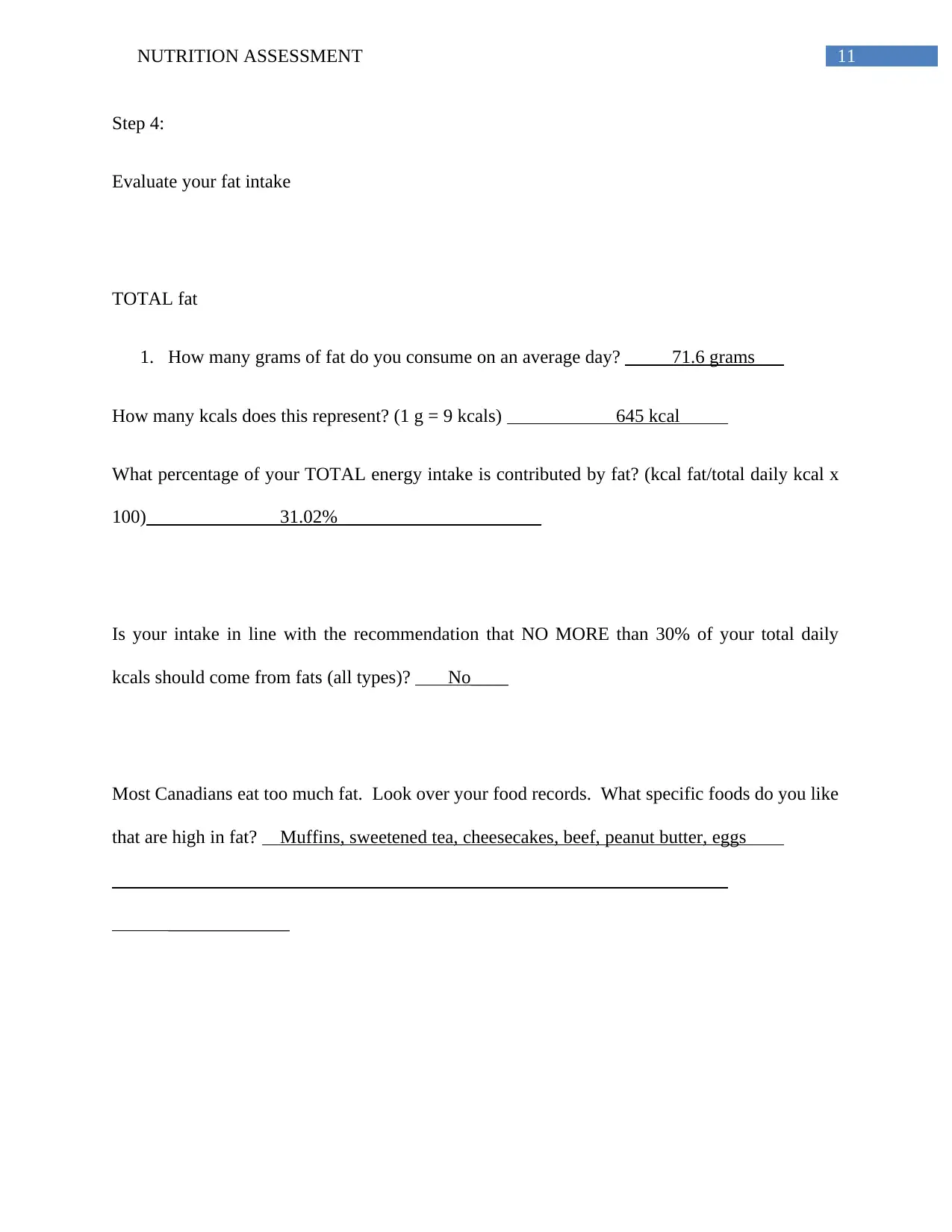
11NUTRITION ASSESSMENT
Step 4:
Evaluate your fat intake
TOTAL fat
1. How many grams of fat do you consume on an average day? 71.6 grams
How many kcals does this represent? (1 g = 9 kcals) 645 kcal
What percentage of your TOTAL energy intake is contributed by fat? (kcal fat/total daily kcal x
100) 31.02% ____
Is your intake in line with the recommendation that NO MORE than 30% of your total daily
kcals should come from fats (all types)? No____
Most Canadians eat too much fat. Look over your food records. What specific foods do you like
that are high in fat? Muffins, sweetened tea, cheesecakes, beef, peanut butter, eggs
_____________
Step 4:
Evaluate your fat intake
TOTAL fat
1. How many grams of fat do you consume on an average day? 71.6 grams
How many kcals does this represent? (1 g = 9 kcals) 645 kcal
What percentage of your TOTAL energy intake is contributed by fat? (kcal fat/total daily kcal x
100) 31.02% ____
Is your intake in line with the recommendation that NO MORE than 30% of your total daily
kcals should come from fats (all types)? No____
Most Canadians eat too much fat. Look over your food records. What specific foods do you like
that are high in fat? Muffins, sweetened tea, cheesecakes, beef, peanut butter, eggs
_____________
⊘ This is a preview!⊘
Do you want full access?
Subscribe today to unlock all pages.

Trusted by 1+ million students worldwide
1 out of 32
Related Documents
Your All-in-One AI-Powered Toolkit for Academic Success.
+13062052269
info@desklib.com
Available 24*7 on WhatsApp / Email
![[object Object]](/_next/static/media/star-bottom.7253800d.svg)
Unlock your academic potential
Copyright © 2020–2026 A2Z Services. All Rights Reserved. Developed and managed by ZUCOL.




